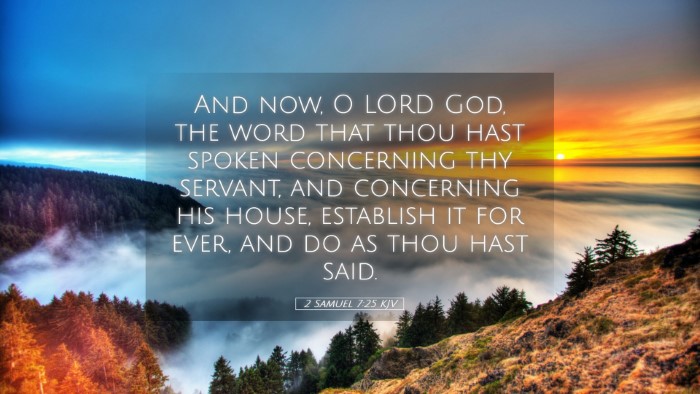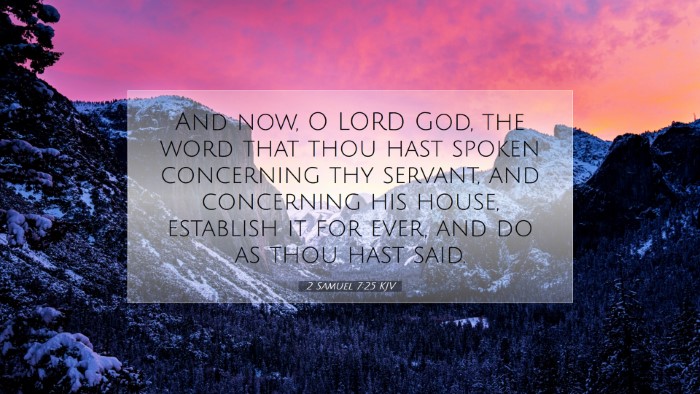Commentary on 2 Samuel 7:25
Verse Context: 2 Samuel 7:25 states, "And now, O Lord God, the word that thou hast spoken concerning thy servant, and concerning his house, establish it for ever, and do as thou hast said." This verse is part of a larger narrative where God establishes His covenant with David, promising that his lineage will endure forever.
Historical and Theological Insights
This passage comes from a time of significant transition in Israel's history, marked by the establishment of a monarchy under David. The prophetic word received by Nathan, the prophet, highlights God's sovereignty and the everlasting nature of His promises.
Matthew Henry's Commentary
According to Matthew Henry, this verse encapsulates a deep sense of faith and reliance on God's promises. He outlines that David’s prayer reflects his understanding of the gravity of God's word. Henry emphasizes that it is not merely David's desire, but a humble acknowledgment of God’s power to fulfill His promises. He notes:
- The importance of God's word: "Establish it for ever" signifies a request for God to confirm and sustain His covenant.
- David's humility: By addressing God as "O Lord God," David recognizes his own humble position in relation to the Divine.
- Promise of the House of David: This promise foreshadows the coming of Christ, who would ultimately fulfill the covenant made to David.
Albert Barnes' Commentary
Albert Barnes focuses on the implications of the covenant. Barnes argues that David's request highlights a profound recognition that God’s promises require divine initiative for their realization. He states:
- Divine Assurance: The need for God to "do as thou hast said" emphasizes reliance on God’s faithfulness to His word.
- Covenantal Relationship: This interaction is a foundational moment for understanding God’s covenant with His people, which continues to have relevance today.
- Future Fulfillment: Barnes notes that the line of David ultimately leads to Jesus Christ, reinforcing the endurance of God's promises through time.
Adam Clarke's Commentary
Adam Clarke provides a thorough analysis of the spiritual implications of this request, explaining that David's plea is not just for his house but for the whole of Israel. He posits:
- Corporate Significance: Clarke highlights that David's reign holds significance beyond his lifetime, affecting the entire nation.
- The Assurance of Perpetuity: Clarke emphasizes that God's response to David's plea speaks to the perpetuity of the Davidic line, which is central in understanding Messianic prophecy.
- Theological Reflection: Clarke encourages readers to reflect on the nature of divine promises and their implications for individual believers today.
Theological Implications for Today
This verse and its commentaries remind us of several key theological truths relevant for pastors, students, and scholars:
- The Faithfulness of God: God's commitment to His word stands central to biblical theology, presenting Him as a trustworthy covenant-keeper.
- God’s Sovereignty: The establishment of the Davidic covenant serves as a reminder of God’s ultimate control over history and His plans, bringing hope to believers.
- The Nature of Prayer: David's request is a model for prayer. It encompasses faith in God’s promises and an acknowledgment of His power to fulfill them.
- Messianic Expectation: This verse signifies not only a historical covenant but also a forward-looking promise that finds its climax in Christ, the ultimate heir of David’s throne.
Conclusion
2 Samuel 7:25 serves as a powerful reminder of the enduring nature of God’s promises. In the context of David's appeal to God, it invites believers to trust in God's faithfulness in their lives and in the unfolding of His redemptive plan. The combined insights of Henry, Barnes, and Clarke provide a multifaceted understanding of this pivotal scripture, encouraging ongoing theological reflection and application.


